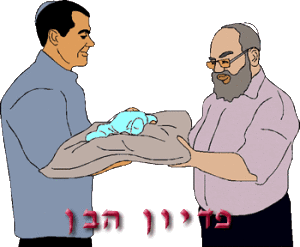
By Rabbi Ari Enkin, rabbinic director, United with Israel
The Torah requires a father to “redeem” his firstborn son from a Kohen (a member of the priestly class) 30 days after his birth. One reason for this mitzvah (Torah commandment) is that God originally intended that all firstborn males would serve in the priestly role. It was only after the sin of the Golden Calf that God took the privilege away from the firstborn and gave it to the Kohanim (plural for “kohen” – patrilineal descendants of Aaron, the brother of Moses) instead. As such, the pidyon haben is essentially a ceremony in which the firstborn, who should have been an acting Kohen, is formally released to “civilian” status. The pidyon haben ceremony also recalls how God spared the Jewish firstborn when He killed the firstborn of the Egyptians.
The father redeems his son by giving a Kohen five silver coins. Actually, the father may give the kohen any object of equal value to five silver coins such as a pen, watch or jewelry. If money is going to be used for the pidyon haben, it should be coins rather than paper money. The Kohen is permitted to return the coins or other item used for the pidyon haben after the ceremony is completed should he so desire. The child need not be present in order to perform the pidyon haben. Hence, a father who is away from his family may perform the pidyon haben wherever he may be 30 days after his child was born. Alternatively, he may appoint an agent to perform the pidyon haben ceremony on his behalf.
A Rare Ceremony
A pidyon haben ceremony is rare, however, as there are a number of conditions that must be met in order for a pidyon haben to be required. For example, if either the mother or the father is a Kohen or a Levite (of the tribe of Levi), the pidyon haben is not performed. Additionally, if the mother had ever experienced a miscarriage, the baby is no longer considered to be the firstborn, and therefore a pidyon haben is not performed. So, too, the baby must have been delivered in a natural manner. If the baby was born by caesarian section he will not require a pidyon haben.

(halachipedia.com)
A child who was orphaned should be redeemed by the local rabbinical court, while other authorities rule that he should redeem himself when he is older. If, for some reason, a child was not given a pidyon haben and later realizes it during adulthood, it is a matter of dispute as to who is responsible to perform the pidyon haben. Some authorities maintain that once a child becomes an adult, the responsibility for his redemption is on him. Others rule that the mitzvah of pidyon haben remains the obligation of the father regardless of his son’s age. According to all authorities, however, if the father has died or is unwilling to perform the pidyon haben, then the adult son must do it himself. In ancient times, one who was not redeemed – for instance, if his father had died beforehand – would wear a special necklace in order to remind him to redeem himself upon reaching adulthood.
The baby is traditionally presented to the Kohen at the ceremony upon a silver tray decorated with jewels. If the 30th day following the child’s birth falls on Shabbat, then the pidyon haben is postponed to the next day. A festive meal should be served as part of the pidyon haben. It is considered especially auspicious to take part in the pidyon haben meal. We are taught that one who does so is considered to have observed 84 fast days. If the 30th day falls on a fast day, then the pidyon haben takes place at the conclusion of the fast, when the festive meal may be held.
Send Passover Packages to Needy Israeli Soldiers - Bring Them Joy!
We are honored to thank the young men and women of the IDF who risk their lives every day to protect the citizens of Israel. Since October 7th, soldiers have been on the battlefield for months - many are hoping to come home for Passover.
Join us in sending Passover food packages (and personal notes) to Israeli soldiers and their families.
Many soldiers spend the Passover holiday with needy families back home. The soldiers greatly appreciate your love and concern. Bring them Passover joy!
CLICK HERE TO SEND YOUR PACKAGE AND NOTE TO ISRAELI SOLDIERS!



